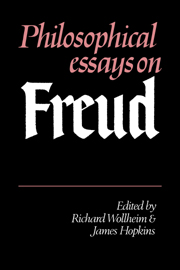Book contents
- Frontmatter
- Contents
- Introduction: philosophy and psychoanalysis
- 1 Conversations on Freud; excerpt from 1932–3 lectures
- 2 Freud, Kepler, and the clinical evidence
- 3 Critical empiricism criticized: the case of Freud
- 4 Freudian commonsense
- 5 Disposition and memory
- 6 On Freud's doctrine of emotions
- 7 The id and the thinking process
- 8 The bodily ego
- 9 Norms and the normal
- 10 On the generation and classification of defence mechanisms
- 11 Models of repression
- 12 Mauvaise foi and the unconscious
- 13 Self-deception and the ‘splitting of the ego’
- 14 Freud's anthropomorphism
- 15 Freud's anatomies of the self
- 16 Motivated irrationality, Freudian theory and cognitive dissonance
- 17 Paradoxes of irrationality
- Works of Freud cited
- Select bibliography
8 - The bodily ego
Published online by Cambridge University Press: 01 October 2009
- Frontmatter
- Contents
- Introduction: philosophy and psychoanalysis
- 1 Conversations on Freud; excerpt from 1932–3 lectures
- 2 Freud, Kepler, and the clinical evidence
- 3 Critical empiricism criticized: the case of Freud
- 4 Freudian commonsense
- 5 Disposition and memory
- 6 On Freud's doctrine of emotions
- 7 The id and the thinking process
- 8 The bodily ego
- 9 Norms and the normal
- 10 On the generation and classification of defence mechanisms
- 11 Models of repression
- 12 Mauvaise foi and the unconscious
- 13 Self-deception and the ‘splitting of the ego’
- 14 Freud's anthropomorphism
- 15 Freud's anatomies of the self
- 16 Motivated irrationality, Freudian theory and cognitive dissonance
- 17 Paradoxes of irrationality
- Works of Freud cited
- Select bibliography
Summary
1. ‘The ego’ Freud writes in The ego and the id ‘is first and foremost a bodily ego’ (1923b, XIX, 26). ‘The Bodily Ego’, a striking phrase, does not recur in Freud's writings. Nevertheless I believe there to be a thesis of the bodily ego which plays an important part, certainly in Freud's later, but probably also in his earlier, thinking. In this essay I want to consider the nature of this thesis, and to say something about its place within Freudian theory.
2. The thesis of the bodily ego contributes to the question how mind and body are related, or the mind–body problem. Currently, it is true, the problem is interpreted very narrowly, only one relation – that of identity – is taken into account, and only the question whether mind is identical with body is raised. To this question the thesis of the bodily ego has nothing to say, and the contribution that the thesis makes to the mind–body problem becomes apparent only when the full range of theoretically interesting relations between mind and body is taken account of. Let us see how those relations are reached.
To the question whether mind is identical with body or whether for every mental particular – a thought, a feeling, an access of desire – there is some physical particular with which it is identical, the answer may be yes or no. Those who answer yes subscribe to the identity thesis and are, on ordinary metaphysical assumptions, materialists.
- Type
- Chapter
- Information
- Philosophical Essays on Freud , pp. 124 - 138Publisher: Cambridge University PressPrint publication year: 1982
- 5
- Cited by



